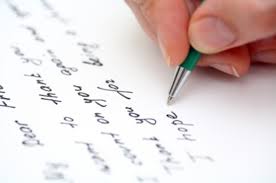Why letters are still meaningful in a digital age
 In this age of electronic mail, Facebook friends and even the first experiments with self-driving cars, writing letters with pen and paper can feel old-fashioned. After all, if you can do it with a computer faster and with less effort, then it must be better. Or so we’re led to believe.
In this age of electronic mail, Facebook friends and even the first experiments with self-driving cars, writing letters with pen and paper can feel old-fashioned. After all, if you can do it with a computer faster and with less effort, then it must be better. Or so we’re led to believe.
The fact of the matter is that the human touch is still essential to our well-being. The sights, smells, sounds and textures of daily living soothe our nerves, stimulate our creativity and connect us to one another. Consider these examples:
When you gather together with friends and family, you end up in the kitchen, with all the smells and sounds of cooking.
Walking barefoot–in the sand, on a lawn or in the mud–is one of the simple pleasures of summer.
A handshake is still the best way to seal a deal.
And what college student doesn’t love a care-package, complete with home-baked cookies and a love note?
The Power of Handwritten Letters
Sitting down to write a letter, as humans have done for at least a thousand years, is another such indispensable experience.
You select a piece of paper and a pen that feels just right. Then you choose a chair, perhaps with an enjoyable view. You might listen to music or simply the breeze wafting through the window curtains.
And then you write.
You write what’s on your mind, in your heart and even sometimes what flows out of your soul.
You fold your letter, you place it in the envelope, you address it and you stamp it. Then you leave it for the mail carrier or bring it to the post office.
Your letter makes its journey…and what happens next?
Where the Magic Happens
First, there’s delight and surprise at the mailbox.
Think of the next sensations. There’s the look of the canceled stamp and the feel of the envelope, which may be a little worse for the wear.
Some people may wait to read the letter at a more leisurely time when all words can be savored and considered. Others may tear open the envelope right away.
Then there’s the sound of paper ripping. And paper unfolding.
The paper crinkles in hand as smooth sheets slip against each other.
The handwriting–so personal, so individual–reflects an aspect of personality that a typed email can never reveal. The slanting, curling letters pressed into paper, sometimes lightly, other times deeply, are as unique as the individual who made them.
It’s quiet for a while as words register in the eyes, then the brain, and the heart. Emotions, thoughts, feelings tumble about.
After the letter is read, perhaps favorite parts are re-read. Maybe at supper that evening, certain passages are read out loud to family or friends.
Later that evening, the process begins anew: The writer selects a piece of paper and a pen that feels just right…
Digital communication can not replace the tactile joy or simple pleasures of paper and pen.
What do you think?


